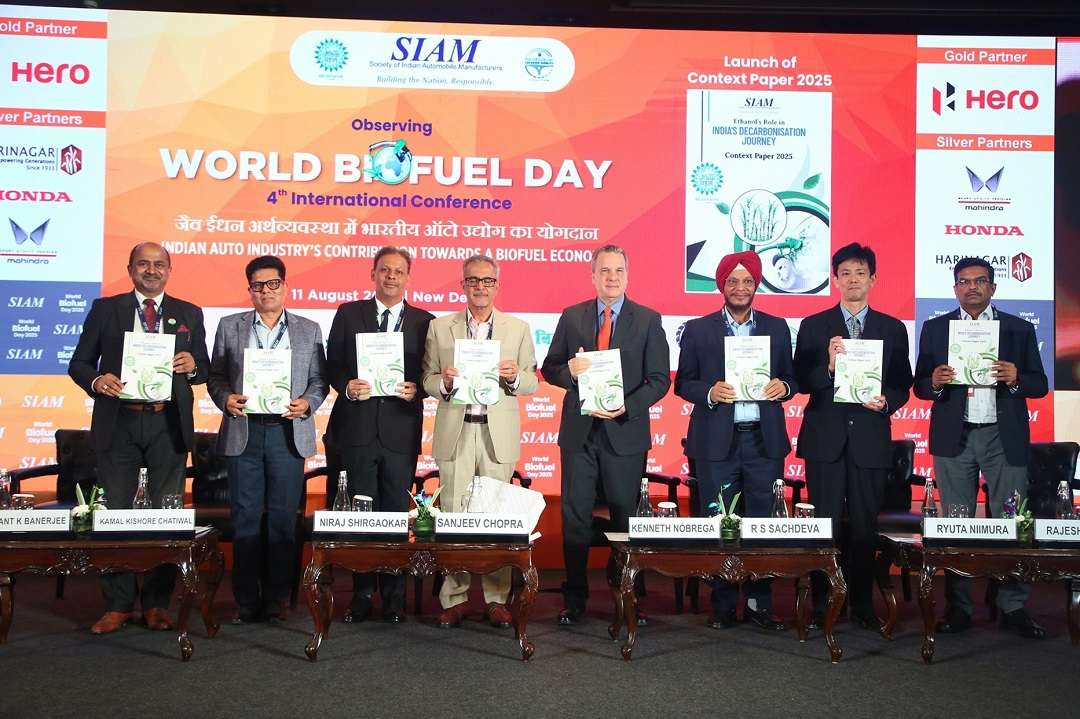The Society of Indian Automobile Manufacturers (SIAM), under its Jaivik Pahal (Bio Initiative) programme, convened the 4th International Conference on World Biofuel Day 2025 in New Delhi. With the theme “Indian Auto Industry’s Contribution Towards a Biofuel Economy,” the event gathered policymakers, global experts, industry executives, and sustainability advocates to chart the path for India’s biofuel-powered mobility future.
The opening session, “Charting the Roadmap for Biofuel Adoption in the Country,” set the agenda with discussions on policy frameworks, technological advances, and coordinated industry efforts needed to accelerate biofuel integration. Welcoming participants, SIAM Executive Director Prashant K Banerjee said ethanol adoption aligns India’s climate goals with sustainable development, creating cleaner cities, rural prosperity, and improved public health. He emphasised that biofuels could become a defining feature of India’s global identity through innovation and public-private collaboration.
Guest of Honour Sanjeev Chopra, Secretary, Department of Food and Public Distribution, highlighted India’s early achievement of 20% ethanol blending—five years ahead of the 2030 target—attributing it to the 2018 National Biofuel Policy and expanded feedstock eligibility. Representing Brazil, Ambassador Kenneth Félix Haczynski da Nóbrega stressed that strong and predictable regulatory frameworks are as vital as technology and resources in making biofuels a cornerstone of cleaner air, rural growth, and energy security.
Industry leaders from across the automotive and energy sectors outlined significant contributions toward advancing India’s biofuel adoption. RS Sachdeva of VE Commercial Vehicles highlighted notable progress in biodiesel blending and incorporating biogas into CNG, emphasising that feedstock reliability and coordinated collaboration across sectors are essential for long-term success.
Representing Japanese automotive expertise, Ryuta Niimura of Honda Motor Co, Japan, focused on ethanol’s carbon-neutral credentials and its compatibility with existing fuel infrastructure. He stressed that ethanol’s domestic production potential not only reduces emissions but also supports local economies, making it a practical and scalable solution for India’s transport decarbonisation goals.
From the gas distribution sector, Kamal Kishore Chatiwal of Indraprastha Gas Ltd projected that biogas could make up 10% of CNG by 2030, provided challenges like feedstock aggregation and municipal waste segregation are addressed. He urged stakeholders to view waste as a valuable energy source that can contribute meaningfully to India’s sustainable development.
In the sugar industry, Niraj Shirgaokar of The Ugar Sugar Works Ltd underlined ethanol’s dual role in reducing transport emissions and enhancing rural livelihoods. He advocated for a phased increase in the national ethanol blend from the current E20 to E25, E27, and eventually E30, ensuring that the momentum in ethanol production benefits both the environment and farming communities.
These commitments were complemented by three thematic sessions that explored key enablers for scaling biofuels. The first, “Ethanol Blending Program: Beyond E20,” led by Puneet Anand of Hyundai Motor India, examined policy and technical strategies for advancing blending targets, noting that most new vehicles are already E20 compliant.
The second, “Developing Advanced Biofuels,” chaired by Harjeet Singh of Hero MotoCorp, showcased innovations in 2G ethanol, compressed biogas, and low-carbon liquid fuels with contributions from NITI Aayog, BPCL, and industry experts. The third, “Sustainable Feedstock for Atmanirbhar Biofuel Production,” moderated by R Ramaprabhu of Mahindra & Mahindra, addressed securing and optimising raw materials, including promising new crops such as sweet sorghum, to ensure steady supply for higher blending levels. A context paper, “Ethanol’s Role in India’s Decarbonisation Journey,” was released, outlining practical steps to scale biofuel use in transport.
Closing discussions reinforced that achieving India’s clean mobility targets will require robust partnerships among government, industry, and research institutions. The conference positioned biofuels not only as an environmental solution but as a driver of economic resilience and rural empowerment.
The Society of Indian Automobile Manufacturers (SIAM) is the premier national association representing leading vehicle and engine manufacturers in India. Established with charitable objectives and registered under the Societies Registration Act of 1860, SIAM works to strengthen the automotive sector’s contribution to the nation’s economic growth and development. Its mission includes supporting the industry in fulfilling social responsibilities, improving operational efficiency, and advancing industry-wide standards.
A key area of SIAM’s work is promoting environmental sustainability and enhancing road safety for both vehicle users and the public. Through advocacy, research, and collaborative initiatives, the organisation addresses pressing issues such as emissions reduction, cleaner mobility solutions, and the protection of road users.
In recognition of its objectives and public-oriented mission, SIAM has been registered under the Income Tax Act, 1961 as an institution serving charitable purposes. This designation underscores its role in driving initiatives that go beyond commercial interests to deliver broader societal benefits.
By bringing together stakeholders from across the automotive value chain, SIAM facilitates dialogue, policy alignment, and knowledge exchange. Its efforts help ensure that India’s automobile industry not only meets regulatory standards but also leads in innovation, sustainability, and safety practices. Through its various programmes and campaigns, SIAM continues to position the Indian automotive industry as a responsible and forward-looking sector, committed to national development, environmental stewardship, and public welfare.








